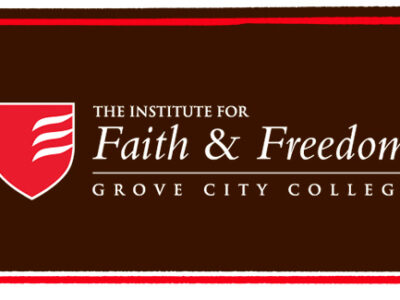Editor’s Note: One of the don’t-miss features in every new copy of National Review when it arrived at newsstands and in mailboxes was the latest William F. Buckley, Jr. “RIP” tribute to some national figure who had just passed on, whether a big name, like a former president, to a name obscure today but a factor (for better or worse) in the politics of the period, from the likes of Scoop Jackson to Owen Lattimore to (recently) Lady Astor. Buckley did not cherry pick the headliners. That was because William F. Buckley, Jr. loved life, and appreciated life—every life. It was a measure of the man that he paused to pay homage to those who passed and left their footprints on the stage of history.
Here today we pause to offer our tributes to Mr. Buckley, who passed away this week at the age of 82. Buckley was a fan of Grove City College, and in fact was our baccalaureate speaker in May 1991. May this remarkable, faithful man rest in peace.
I was in the Zurich airport on a very wintry day in February 1981. I had been negotiating a technical license agreement with a Swiss Company for a client and was returning to the United States. I was in a large bookstore in the airport that was deserted except for two potential customers rummaging through a large bin of discounted books. We didn’t really take close note of each other until we were about three feet apart and were both reaching into the bin for the same book. I looked up and instantly recognized William F. Buckley. I introduced myself as a Grove City College graduate. He knew the school very well and not surprisingly in a very favorable manner. With Mr. Reagan having just taken office as president, I asked him how he felt now that the republic had once again been preserved. “Nothing could be finer,” I recall him saying (and he, as we all know, was not from Carolina). He told me he was skiing near his place in Switzerland and was returning to New York City (and his Connecticut home) via Frankfurt. I bid him goodbye and returned to Pittsburgh through Boston. Later I met him in 1991 when I was a trustee of Grove City College and he came that spring to deliver the commencement address.
By John A Sparks, J.D.
In 1951, the late William F. Buckley, Jr. issued one of the best-known challenges to higher education. In what became a conservative classic, God and Man at Yale, Buckley, then a recent Yale graduate, first called upon U.S. colleges and universities to rejuvenate the Christian spiritual and moral roots from which they had sprung. Buckley began with the question which many parents of college-bound students would ask over the next several decades: “whether Yale [substitute almost any university or college] fortifies or shatters the average student’s respect for Christianity.”
Buckley referred to Yale’s ancient charter of 1701, which charged the Yale leadership to “erect a collegiate school” where students could be instructed in the arts and sciences and “who through the blessings of almighty God may be fitted for public employment both for church and civil state.” Yet, continued Buckley, A. Whitney Griswold, installed as Yale’s 16th president almost 250 years later (1950), did not even mention Christianity in his inaugural address, though he cited other “vital forces” and “traditions” which shaped Yale. What had happened, and what had actually accelerated after 1950, was the secularization of much of American higher education. In fact, today, as George Marsden puts it, any faith-based analysis of the important questions of God and man is viewed by many in academe as “outrageous.”
The second complaint pointed out by the young Buckley was the willingness of Yale faculty to dismiss “free enterprise” and “limited government” which “had served this country well.” If Yale students came to college expecting to have freedom and individual responsibility explained and elaborated, they instead received a one-sided case for the deification of collectivism—that is, increasing governmental intervention in the economy, statist redistribution of wealth, heavier tax burdens and an advocacy of the regulatory state. In this regard, Yale was certainly not alone over the next six decades. The typical university campus today, with some exceptions, is properly categorized as leftist. In fact, as Russell Kirk often put it, the American campus is so politicized that the stances of its students and professors (again with some exceptions) can only be described as “lunatic.”
Thankfully, a few schools, including my own, Grove City College, maintained and watered their religious roots and stood strong for liberty and a vigorous private sector; but not many. In the process, Grove City students hear all views on a variety of subjects, including arguments for faith and freedom, and are not subjected to the provincialism and narrowness of a leftist-leaning education. All this is in large part due to the man who began alerting his fellow citizens about the rejection of Christianity and liberty at Yale. Thank you, William F. Buckley, for this and your many other contributions to ordered liberty.
About two or three years ago, I was in New York City on business. I had a few hours to kill, so I made a pilgrimage to the offices of National Review. One of the staffers was there. He showed me all around and we lingered for a while in WFB’s office. There was both a PC and an old Royal typewriter. The guy explained that WFB still preferred to type much of the time. WFB’s chair looked like it was Civil War era. It was old cracked leather with stuffing come out, etc. The guy said that from time to time people had offered to have it taken out and rehabilitated. But WFB always vehemently refused; he liked it just the way it was.
Here’s the main point: I asked this staffer how long he had been with National Review. He said 18 years or something. I expressed surprise at the length of his service. He said that he was not unusual, that while the columnists may come and go, the staffers tend to have very long service. Two reasons for that, he said: First, they view it not just as a job, but they believe in the magazine’s mission, so they really want to be there. Second, and more importantly, he said, “Mr. Buckley is just an extraordinarily kind man.”
By Michael Coulter, Ph.D.
The one time I met William F. Buckley, Jr. (1925-2008), the great figure of modern American conservatism, he was gracious and inviting. In 1991, he was the commencement speaker for my graduating class at Grove City College. My friends were puzzled at how excited I was to have the eminent Mr. Buckley speak to my classmates and our families. His speech bore the title, “Reflections on Current Contentions,” which was the generic title he used for most of his public-speaking appearances. I can’t remember any particular phrases of the speech, but I do recall that his manner of speech was calm and reasoned. His aim was not to shock or scandalize. After commencement, there was a luncheon attended by parents, graduates and school officials, and there I went to Buckley’s table, interrupted his lunch, and expressed my appreciation for his life’s work. We talked briefly and he told me that if I were ever in New York that I should come by and see him.
Buckley’s graciousness was certainly a product of well-mannered character, but it also speaks to how he helped shape the modern conservative movement. He wanted to invite people into the fold. He wanted to show that one could be intellectual and be a conservative. For Buckley, conservatism was not a narrow sect with specifically defined beliefs; instead, conservatism was a set of inclinations and broad goals. Those inclinations included an admiration for the free market, a strong policy of anti-communism, and a respect for traditionalism.
I am far too young to remember the early days of the National Review, the magazine Buckley founded in 1955 and that was for many years the flagship publication of the American conservative movement, but there are excellent accounts of those days when the different elements of the conservative movement argued with each other, both in the pages of the National Review and in editorial meetings. Buckley provided a place for both free-market devotees and traditionalist conservatives. Many of the great conservative intellectuals of the 1950s and 1960s reached a broader audience through the pages of the magazine. In his own op-ed column, distributed to hundreds of newspapers across the county, Buckley introduced his readers to arguments, ideas, thinkers, and books. It was in the small rural daily paper to which my parents subscribed that I began reading Buckley.
Buckley was reputed for being a great host of dinner parties, and great hosts bring people together and encourage conversation and even collaboration. He served a similar role for modern American conservatism. Through the National Review, his own writings, and his television show “Firing Line,” Buckley served this great function of connecting modern conservatives. He helped with the growth of conservatism and wanted a movement that was not centered on him, but on key commitments of a free and orderly society.
Buckley wanted a conservative movement that was broadly representative of conservative inclinations, but Buckley also recognized that some of those attempting to shape modern conservatism were harmful to the movement. Buckley and the National Reviewessentially kicked the John Birch Society, an extreme right-wing organization, out of mainstream American conservatism. In so doing, he lost subscribers and supporters, but he did not believe that irresponsible voices needed a seat at the table.
Buckley will not be remembered as the greatest intellect of the modern conservative movement, although he certainly had a great intellect. He is certainly not the greatest political figure; political office was not his calling. Buckley, however, served a remarkable role in helping to make conservatism respectable, intellectually compelling, and politically viable. To a man who did more than most could accomplish in five lifetimes, may he rest in peace.
I discovered William F. Buckley, Jr. in the late 1980s as an undergraduate at the University of Pittsburgh, where I was pre-med. I had been bit by the political bug. It was a consequence of the times: the Reagan years, the end of the Cold War, tumultuous changes in the world. I soon found myself blowing off my Genetics exam to feed a growing obsession with politics, reading every newspaper I could get my hands on, and digging through microfiche to satiate a newfound infatuation with the Cold War.
I was also discovering I was a conservative. And it was that growing ideological realization that prompted me one day to ask my father where I could go to find a conservative magazine. Did such a publication exist? He responded without hesitation: “Buckley’s magazine.” I replied, “Buckley’s magazine? What’s that?” My dad answered: “National Review.”
I hopped in the car and headed to Walden Books at Clearview Mall in Butler, Pennsylvania. I found it—National Review. I couldn’t put it down. There was nothing else like it—nothing. The quality of the writing, the material, the insights, the intellect, the logic, the common-sense thinking combined with erudition, the overall smartness. I read it cover to cover, including the articles I didn’t understand. I allowed the thing to teach me. Malcolm Muggeridge, who’s he? I read and learned. I was enthralled.
That magazine led me in the direction of an entirely different field of study, to where I ended up a professor teaching and writing about those very issues and ideas.
Yet, Buckley impacted me more than that, even though I never met the man. I recall one day almost 10 years ago when I was meeting with Lee Edwards, another leader of the conservative movement, who was at Grove City College to do research for a history of the college. I told Lee about the book I wanted to write on Reagan and the end of the Cold War, and how I needed some funding to be able to go to the Reagan Library to do research. Lee suggested I put together a brief proposal, noting his endorsement, and send it to a small, under-the-radar foundation begun by Buckley to support projects like these by young conservative academics. I did just that, and received a check shortly thereafter. It ultimately led to two books on Reagan, God and Ronald Reagan and The Crusader. When I sent Buckley a copy of the manuscript for the first book, he responded with a short note, dated May 22, 2002, offering a nugget of advice on where to publish the work before closing, “I’m glad the little foundation was helpful in getting this done.”
He was helpful in a yet deeper way. Though I do not want to overstate this, I can honestly say that Buckley, and more specifically, his magazine, had a profound effect on me spiritually. When I began reading National Review I was an agnostic, having abandoned the faith of my upbringing. Like many young folks at major secular universities, especially in the hard sciences, I had forsaken the God of Scripture for the idols of evolution, secularism, nihilism, and all the wasteful, destructive idiocy that saturates the tragic insanity of modern academia. I had come to National Review through an interest in politics, but soon discerned that these brilliant writers, whom I respected so much, just happened to be Christians who seamlessly integrated their religion into their politics—faith with reason, Christianity with conservatism. They fit beautifully. This set me on a path to the Christian faith. I will not proclaim that William F. Buckley, Jr. and National Review “saved my soul,” but they no doubt led me in the right direction.
Lastly, on a slightly bitter note, I’m offended—but not surprised—by the conservative outlets who have barely acknowledged Buckley’s death. They are sadly symptomatic of a culture that lives strictly in the here and now, where only something new is deemed newsworthy, and only then for a few minutes. Do these conservatives not know that they stand not only Buckley’s shoulders but in his shadow? He was their forerunner, the voice in the wilderness long before their existence was considered tolerable let alone possible. He never made the mistake of being defined by the moment, which is why he was the quintessential conservative.
William F. Buckley, Jr. and the movement he founded transcended a single news cycle and even a single generation. He stood astride America yelling “stop” for over 50 years. Now, let us pause to honor him with his due respect.




